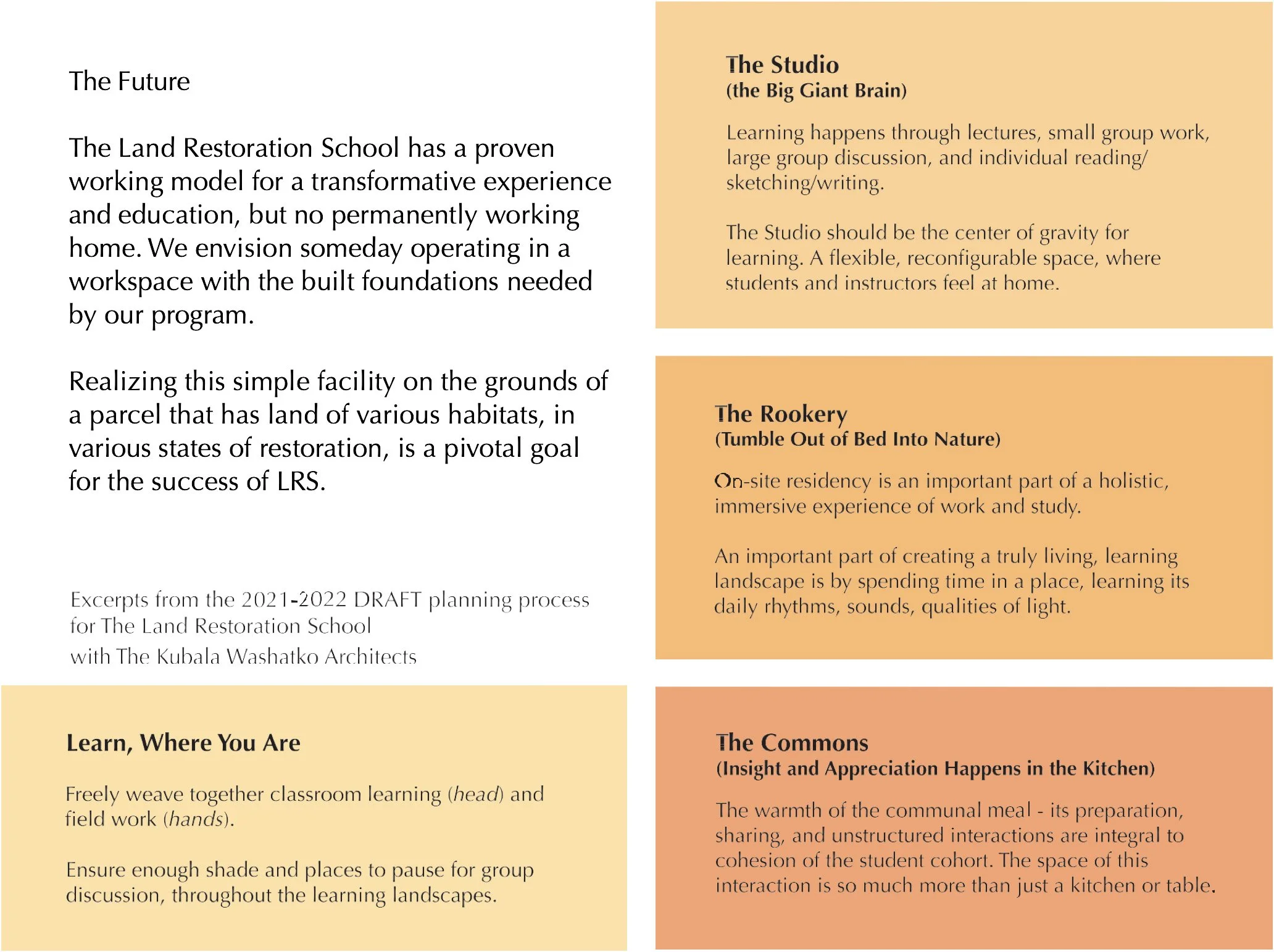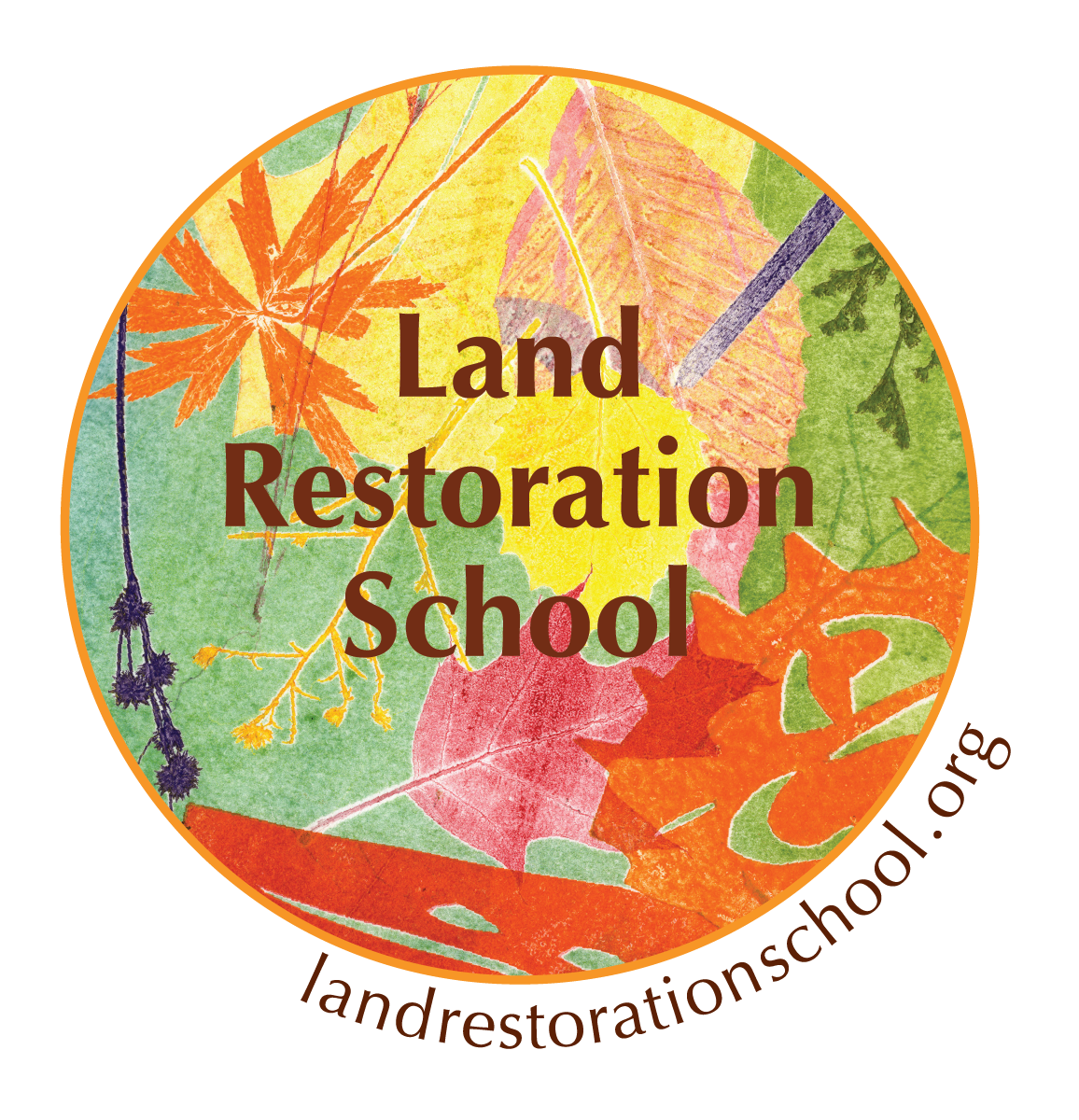
Vision
The Land Restoration School strives to attain excellence within the conservation community and to be a model for change in the world.
Our overarching goal: more practicing ecological restorationists in the world! Launching the careers of ambitious and dedicated individuals to be highly effective in this time of ecological imperative, forming a community for the future.
“Congratulations! You created something beautiful and impactful and can feel really proud.” (LRS guest faculty)
“Each of the cohort made measurable gains – unique to the person. Their transformation was exquisitely represented in their ecological restoration plans and accompanying presentations.” (LRS guest faculty)
The Land Restoration School was founded in 2021.
LRS is a paid, collaborative learning and transformative work experience, teaching the principles, practice and planning of ecological restoration for degraded lands and wetlands. Forty days, four days per week over eleven weeks, mixes classroom and fieldwork experience.
Participants are passionate about the environment, ready to jump in to an intensive educational experience and express a personal goal of working in ecological restoration or an affiliated field. We believe this program appeals to participants beyond traditional college age. Recent high school graduates, career-changers, and current college students are all welcome.
Although we cannot presently offer housing, during the summers of 2022 and 2023, full twelve-week residential programs were held, demonstrating the success of this model, and our long-term vision. [1 of 12]
The pathways toward a career in the practice of ecological restoration are varied. Some get there from an academic background in ecology or conservation coupled with a passion for field work; some use continuing education practicums to develop know-how; some may move in their career as on-the-job experience shifts us towards the field and the practice.
The LRS brings everyone to the level of knowledge and experience framed by the Society for Ecological Restoration: ecological restoration planning and implementation that includes assessment of ecological need, land use history, current conditions, reference models, trajectories, steps, methods and evaluation. With enough case study exposure and business practicalities to support the launch of an ecological restoration career as an independent contractor, or project architect ready to help heal the earth.
Many ways in; and many ways forward. [2 of 12]
One compelling motivation is, of course, that we are living in a consequential time — facing biodiversity and habitat loss and the climate crisis — with a growing awareness of ecological restoration as a societal need, a generational obligation, and a viable career path.
There is universal recognition of this need - From COP15, the UN Conference on Biodiversity, from this past December: TARGET 2 says: “Ensure that by 2030 at least 30% of areas of degraded ecosystems are under effective restoration, in order to enhance biodiversity and ecosystem functions and services, ecological integrity and connectivity.” This is ecological restoration as an important global strategy. [3 of 12]
This is doable. Ecological restoration is a practice, incorporating knowledge and field experience with lifelong learning.
This chalkboard is the compilation conversation with students after the week-long field course, Vegetation of Wisconsin (and that’s Professor Jim Reinartz at the UWM Field Station). It is a great illustration of the field station experience. This diagram, collaboratively made, embodies a lot of learned knowledge and also the power of collaboration and lifelong learning. It represents the kind of integrated knowledge LRS students leave with.
We are building another layer on the field station tradition — with a cohort of 6-12 adults each year, using an outdoor campus as the primary learning landscape with support from indoor studio and classroom to integrate and cogitate — an educational immersion in land restoration. [4 of 12]
The field station host site is the unifying component, a partner in the course, an inspiration for learning. Participants are provided with education in both classroom and in field – hands-on restoration training is an integral part.
Participants are provided a paid fellowship stipend to defray living expenses. Visiting guest faculty receive a paid stipend.
In our future vision (but not presently), participants would be provided with lodging (for non-local participants) as well. To support the multiple pathways of the cohort, we believe that a paid fellowship stipend and provided housing are ultimately necessary. A field station intensive is a change of livelihood and perhaps home and needs to support that, in our ideal future.
Sponsors can provide funds, or can pay the wages of new hires or existing staff while attending the course, in lieu of the LRS paying their stipend. Other partners provide learning landscapes or landscapes with sites needing ecological restoration plans, or guest faculty. [5 of 12]
The LRS addresses the challenge and necessity of training the next generation of ecological restorationists, by bringing together a range of theoreticians and practitioners as guest faculty.
Directors Nancy Aten and Dan Collins, with Curriculum Chair Chris Young, PhD, consultant Martina Patterson, partner August Ball of Cream City Conservation & Consulting, partner Restoring Lands (formerly Ozaukee Washington Land Trust), partner Mequon Nature Preserve, and partner Nearby Nature Milwaukee, form the foundation. To create a vibrant and excellent program, the LRS engages a mix of guest faculty from regional universities, local scientists and ecological restoration practitioners.
The learning framework integrates topics in soils, hydrology, community ecology, field methods, and human engagement, and culminates with participants developing ecological restoration plans for real sites. Our approach is an investment in ‘big seeds’ while helping the practice of ecological restoration become more diverse, inclusive and equitable. [6 of 12]
The curriculum is ecological restoration – assisting the recovery of degraded lands toward ecological health and thereby contributing to climate resilience and community well-being. The curriculum follows the Society for Ecological Restoration framework.
We integrate foundational topics in climate, soils, hydrology, wetlands, community ecology, field methods, map-making and human engagement, and incorporate team-building and entrepreneurship.
We cover each topic in the context of practice, rather than in depth, in order to establish foundations and frameworks, making connections between topics, and enabling the lifelong learning that comes with the practice of ecological restoration. [7 of 12]
Each restorationist develops an ecological restoration plan for an actual site, becoming part of an ongoing portfolio of land restoration work. This approach helps to showcase land restoration work not as transactional, but as a long-term commitment with ongoing, incremental steps.
These are professional-caliber ecological restoration plans, and the restorationists also each present their plan in a public forum.
In the final week of the academic program, graduates receive a badge of Land Restoration School completion. Alumni support is an ongoing practice. [8 of 12]
The Land Restoration School has a proven working model for a transformative experience and education, but no permanently working home.
The Kubala Washatko Architects practice pattern-writing, integral to the process of envisioning a possible future. Working with TKWA, we collectively identified patterns to create a framework that allows confidence in planning and implementing. Pattern-writing is a way to identify the deeper values that are inherent, essential and desired in a place, in ways that suggest solutions. [9 of 12]
We envision someday operating in a workspace that contains the built foundations needed by our program: the Studio (or Big Giant Brain), the Commons (kitchen and common space), and the Rookery (private habitation space for each of the cohort).
Realizing this simple facility on the grounds of a parcel that has land of various habitats, in various states of restoration, is a pivotal goal for the success of LRS. [10 of 12]
In the recent book Wild by Design by Laura J. Martin, she says, “Restoration acknowledges damage, makes it visible, and attempts repair. It is not about where to be [in progress], but how to act.” This encapsulates what we hope with the LRS - empowering ways of acting, in healing the earth. We combine this idea with a quote from James Baldwin, “The place in which I’ll fit will not exist until I make it” and arrive at the forward-facing transformational nexus for those that attend and guide LRS.
We have been inspired by the LRS cohort, who have fulfilled our hopes, which we described as follows: LRS highly values the capacity for transformation within the individuals in the cohort. Participants are hopeful about the opportunities for positive change in the world. We seek participants from a variety of backgrounds and learning experiences so they can create foundations for new ways to think and act in the domains of conservation and restoration ecology. [11 of 12]
Because we also like to geek out, we’d be remiss in not pointing out the fascinating landscapes where we are, in Eastern Wisconsin, the Lake Michigan Basin of the Great Lakes, and right along the Tension Zone of Wisconsin.
The Tension Zone loosely divides glaciated from non-glaciated, cool moister climate from warm drier climate, polar or subtropical air masses, a shifting balance of precipitation and evaporation, an important area for studying and learning climate change, and a place of spectacular habitat and species diversity.
Our challenges moving forward: planning for sustainable funding into the future; continuing to expand representation from people of color (working to “change the faces of conservation”, as Cream City Conservation says); and physical facilities that support and amplify our vision.
For more information, email us. Thank you! [12 of 12]
Thank you to our Partners and Supporters:
















